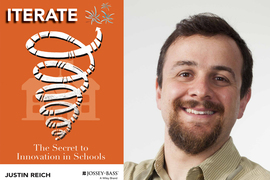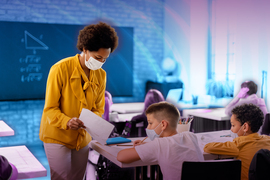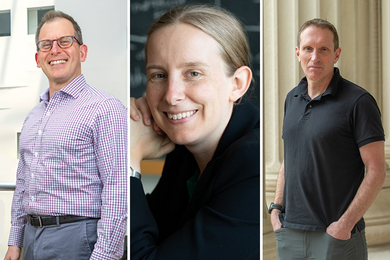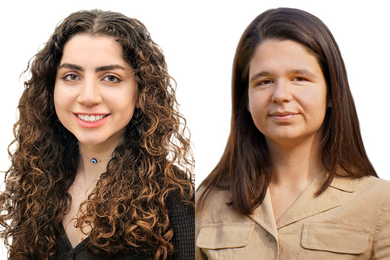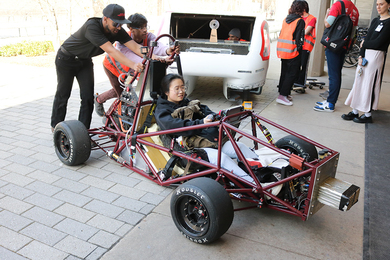With a new academic year under way in the U.S., imagine you have been named superintendent of your local public school district. What changes would you make? How would you make them?
That second question matters greatly. Despite supposedly stark differences among people, data show that most U.S. parents like their local public schools. At issue is not so much a shared vision — students pursuing excellence in a good environment — but how to enact it in busy, complex school districts.
To MIT Associate Professor Justin Reich, an expert on educational innovation, there are right and wrong approaches to improving schools. It is best, Reich believes, to pursue tightly focused sets of classroom changes, see how they work, refine them, and then refine them some more.
“There’s not usually one blockbuster idea that makes schools better,” says Reich, director of MIT’s Teaching Systems Lab. “When schools do get better, it’s because they do 100 things a little more right each time.”
Reich, also a faculty member in MIT’s Program in Comparative Media Studies/Writing, has made this insight the focus of a new book, “Iterate: The Secret to Innovation in Schools,” published today by Jossey-Bass. In it, he sets out a series of principles educators can use to make changes, focused on relatively shorter-term, repeatable experiments.
Reich’s perspective is akin to that of software firms who keep upgrading their products, or Toyota’s famous practice of “continuous improvement.” To be sure, schools are not writing code or making Corollas, but by being open to input and working constructively with teachers, Reich thinks educational leaders can effectively keep their schools moving forward.
“We can make schools better by bringing an iterative, design-oriented mindset to them, while also thinking about the particular challenges educators face,” Reich says.
Try short cycles of improvement — then try them again
“Iterate” draws on the roughly two decades of experience Reich has accumulated, not only as a scholar but as a high school teacher, consultant, and founder of the firm EdTechTeacher. Making innovation iterative, it happens, meshes with the fact that most parents believe their kids are in good schools. It’s likely your district needs less a complete overhaul and more a sustained effort at continuous, incremental improvements.
“The vast majority of parents are shockingly, overwhelmingly, satisfied with their local public schools — they are happy, and believe the instruction aligns with their family’s values,” Reich observes.
Still, things can always get better, and Reich suggests some core ideas for academic innovation. Educators should “think in cycles and spirals,” he writes in the book, which “let us regularly return to the framing of our problems as we design and test new solutions.” Relatedly, Reich writes that schools should “act in short design spirals,” to provide more chances to improve. That also means testing concrete plans, not overly broad goals such as giving “21st-century skills” to students.
“That’s too much to think about,” Reich says. Instead, schools can implement focused programs about, for instance, better executive functioning for students, or improved ways of analyzing evidence. Or they can test new curricula or learning methods.
The key, Reich says, is that “Everybody on the faculty can see themselves doing it, and you can work on it for two to five years and get better at it.”
And yes, developing those plans should occur in concert with the teaching faculty. A core point in “Iterate” is, Reich says, “if you ask teachers who has the most influence on their practice, the number one influence is other teachers. If you want a new practice to be adopted in a school setting, you have to create the conditions for peer learning [among teachers].” In other words, don’t impose ideas upon teachers; work with them.
Of course, in a community of teachers, parents, and students, not everyone will agree with every proposed change. But smaller, iterative changes may seem more palatable and can allow for more people’s ideas to be tested.
“If you can set up approaches to design that feel small and light and doable, then it’s not that painful to test these things,” Reich says. “It makes experimentation easier to swallow.”
And, Reich adds, citing an idea he credits to MIT Senior Lecturer Peter Senge: “We don’t have to come to consensus to keep moving forward. If you watch a really good basketball team or a set of dancers, they may not all agree about everything, but they have alignment. In communities we can have that too. The way to resolve disagreements is to not spend forever talking about them, it’s to design and test so that some resolutions to those disagreements emerge.”
Because they work
In that vein, to help schools succeed, administrators, teachers, and even librarians must sometimes not only focus on internal plans, but engage with external voices, often related to larger culture wars. Despite the broad public satisfaction with public education, Reich notes, “We are in a moment where a minority of parents, and nonparents, are attacking schools in various ways and making their day-to-day operations harder.”
To deal with this, he says, “When you get people into the details of what’s going on, it tends to defuse disagreements. People disagree more in the abstract.” Still, Reich adds, “Schools can’t solve all of these problems on their own. The majority of parents who are happy with the performance of their public schools need to spend more time in active support to prevent their schools from getting damaged. People have to stand up and get engaged.”
Other educational experts have praised “Iterate.” Sam Seidel, the K12 Lab Director of Strategy and Research at Stanford University’s d.school, has said the book is “packed with thoughtful perspectives, real stories, and actionable approaches for how we can create the conditions for positive change in schools.”
For his part, Reich emphasizes that the ideas in “Iterate” are not merely drawn from his own experiences, but borne out in the research of the MIT Teaching Systems Lab, where many researchers and students have studied the evolution of schools and the best mechanisms for helping educators to adapt.
“We’re advocating for these practices not because we’re looking for random things for schools to do, but because they work,” Reich says. “I hope for educators it will help give them confidence that these are good things to try, because they’re well-established, and from a place that’s pretty good at imagining the future.”
